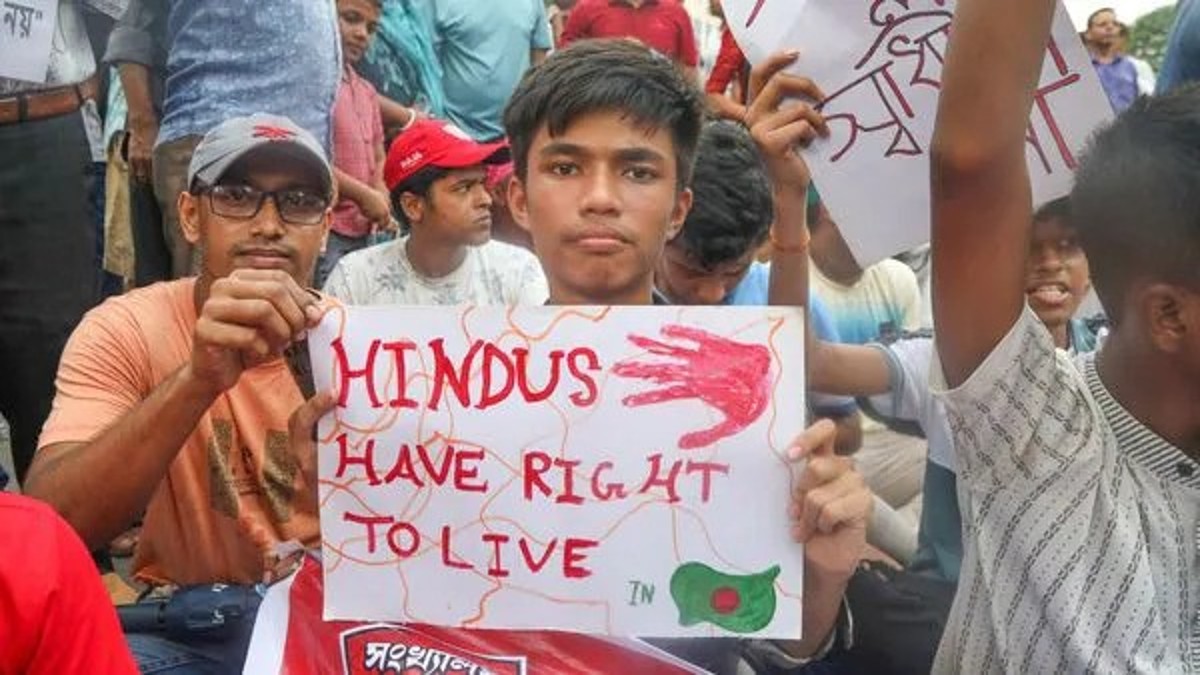Being a Hindu in Bangladesh is akin to living in a perpetual state of fear and insecurity, where the mere practice of faith can incite violence and persecution. The plight of Hindus today in Bangladesh is a grim reminder of the communal tensions that have plagued the subcontinent since partition in 1947. Despite the secular facade projected by the Bangladeshi government, the reality for Hindus in the country is quite different, marked by violence, discrimination, and constant violations of their rights and security.
Bangladesh, a part of the larger Indian subcontinent, once a part of undivided India, has seen an alarming decline in its Hindu population over the decades. What was once a vibrant community now faces a systematic extermination reminiscent of the horrors witnessed during the Noakhali riots of 1946. The Hindu population, which was nearly 30 per cent in 1947, has now dwindled to just approximately 8 per cent. The rapid decline in numbers is not just a statistic but a reflection of the dire conditions in which Hindus are forced to live.
Hindus in Bangladesh face routine violence, especially during major religious celebrations such as Durga Puja and Navaratri. For instance, in October 2021, during the Durga Puja celebrations, unfounded rumours about the desecration of the Quran led Hindus to widespread violence across the country. Mobs gathered at Hindu gatherings, desecrated idols, destroyed more than 50 temples, and unleashed terror on the community. Hindu men were killed and women were subjected to the most brutal form of violence—gang rape.
The use of sexual violence as a weapon against Hindu women is a recurring and alarming trend in Bangladesh. Women are often abducted, raped, and forcibly converted to Islam, stripped of their dignity and humanity. State response to such atrocities was lukewarm at best, and perpetrators often enjoyed impunity because of their political connections or social status.
Impact Shorts
More ShortsThe Bangladeshi government’s response to the violence against Hindus has been tepid, characterised by empty promises and delayed action. Former Prime Minister Sheikh Hasina’s assurances of strict action against the perpetrators did little to stem the tide of violence. Even when arrests are made, these actions are often too little and too late. The police, who are supposed to protect all citizens, often stand as mute spectators and strengthen the aggressors by their inaction.
The military, which has significant influence in Bangladesh, has also failed to provide Hindus with the protection they need. Despite being a secular institution, the military’s role in protecting minorities has been controversial. In a country where the rule of law is tenuous at best, the military’s indifference to the plight of Hindus further exacerbates their vulnerability.
What is needed now is not just a token arrest or a statement of condemnation, but concrete action to ensure the safety and dignity of Hindus in Bangladesh. Muhammad Yunus-led caretaker government today must come forward and recognise that the continued persecution of Hindus is not only a human rights issue but a threat to the very fabric of Bangladeshi society. Unless the government and military act decisively, Bangladesh’s Hindu population will continue to shrink, and with it the diversity and tolerance that are hallmarks of a truly secular nation.
Perhaps the most disheartening aspect of the plight of Hindus in Bangladesh is the deafening silence of the international community, including renowned human rights organisations and advocates of secularism. The indifference of Western media is equally disturbing. Violence against Hindus in Bangladesh rarely makes headlines in Western newspapers, and when it does, it is often buried on the inside pages.
The United Nations, which has been vocal about human rights abuses in other parts of the world, largely ignores the plight of Hindus in Bangladesh. Similarly, organisations such as Amnesty International and Human Rights Watch do not give this issue the attention it deserves. This silence on the part of India’s liberals and the international community is not only a moral failure but also a strategic mistake. The continued persecution of Hindus in Bangladesh is a recipe for regional instability with the potential to create a refugee crisis that could spill over into India.
The suffering of Hindus in Bangladesh cannot continue unchecked. It is imperative that the Bangladeshi government and the military take immediate and decisive action to protect the Hindu community. This includes ensuring that perpetrators of violence are brought to timely justice, providing adequate security for Hindu religious gatherings, and addressing the systemic discrimination faced by Hindus in Bangladesh.
India must fulfil its moral and historical responsibility by coming together as one strong nation to raise awareness about the persecution of Hindus in Bangladesh. Prime Minister Narendra Modi has strongly urged Bangladesh to ensure the Hindu community’s security. It is vital that the Indian media, politicians, and civil society raise the issue, while the international community, especially human rights organisations, must ensure that Bangladesh remains responsible towards protecting its Hindu minority.
The persecution of Hindus in Bangladesh is a grave injustice that needs to be urgently and decisively addressed. The silence of the international community only serves to embolden the perpetrators and prolong the suffering of millions of innocent people. It is time for the world to wake up to the reality of what it means to be a Hindu in Bangladesh and take action to stop the violence and discrimination before it is too late!
The author is a policy researcher, political and social activist, and aspiring author. He addresses contemporary issues spanning people, policy, and politics with profound insight and clarity. Views expressed in the above piece are personal and solely those of the author. They do not necessarily reflect Firstpost’s views.
)